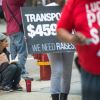-
 +6 +1
+6 +1Sanders: Welfare reform more than doubled 'extreme poverty' - Mostly True
One thing that sets Democratic presidential candidate Bernie Sanders apart from opponent Hillary Clinton is that he opposed a 1996 law known widely as welfare reform. The Vermont senator said the Personal Responsibility and Work Opportunity Act, which both Democratic President Bill Clinton and a bipartisan Congress supported, contributed to poverty today.
-
 +10 +1
+10 +1How to level the playing field for working families
The Family and Medical Leave Act was a huge step forward for working families, but it’s not nearly enough.
-
 +25 +1
+25 +1How we can save $17 billion in public assistance—annually
Raising the federal minimum wage to $12 by 2020 would lift wages for more than 35 million workers nationwide and generate about $17 billion annually in savings to government assistance programs.
-
 +20 +1
+20 +1This might be Ted Cruz’s worst idea
Ted Cruz has come down with a bad case of Midas delusion. Now, it usually only afflicts people wearing bowties, but the politicians those people donate to are also at risk. We can't say for sure if that's how Cruz contracted it, but the fact that his biggest benefactor is a goldbug means that we can't rule it out either.
-
 +21 +1
+21 +1Congrats on That New Citywide Minimum Wage. Now Republicans Are Going to Try to Kill It.
As cities throughout the country pass minimum-wage raises, GOP state legislators have a wicked little plan to undo them.
-
 +27 +1
+27 +1“We cannot talk about it”: Factory workers for major fashion labels live confined by guards
Many female workers were only allowed to leave their "hostels" for two hours a week.
-
 +22 +1
+22 +1Mandatory arbitration unfairly tilts the legal system in favor of corporations and employers
Employees are much less likely to win in mandatory arbitration than in federal court: employees in mandatory arbitration win only about a fifth of the time (21.4 percent), whereas they win over one-third (36.4 percent) of the time in federal courts.
-
 +30 +1
+30 +1City and metropolitan inequality on the rise, driven by declining incomes
To understand the state of local inequality today, this analysis updates and extends previous Brookings analyses of income inequality in cities. Like those earlier analyses, it focuses on the difference between incomes near the top of the distribution and those closer to the bottom of the distribution. This analysis examines each of the 100 largest U.S. metro areas, and the largest city in each of those metro areas, using new data from the 2014 American Community Survey.
-
 +21 +1
+21 +1With public sector unions on the rocks, middle class may take another hit
The decline of union coverage is responsible for about 35 percent of the drop in the share of the workforce that falls within the middle class, the researchers found.
-
 +14 +1
+14 +1National Association of Manufacturers’ criticisms of the Obama overtime proposal all miss their mark
Last September, the National Association of Manufacturers (NAM) filed comments in opposition to the Labor Department’s proposed rule on overtime pay for salaried workers, which would raise the salary threshold under which all workers are eligible for overtime pay from $23,660 to $50,440. NAM’s chief criticism boils down to this: “The Labor Department set the salary level threshold for exemption too high.” The evidence NAM presents to support that criticism, however, is inaccurate...
-
 +29 +1
+29 +1Thinking Harder about Political Correctness
The best response to the right's indictment of PC culture is a more robust solution to persistent inequality.
-
 +8 +1
+8 +110 Moral Crises That Have Resulted From Unfettered, Free Market Capitalism
On the free market it is legal and customary to violate the dignity of our fellow human beings.
-
 +52 +1
+52 +1When You’re Poor, Life’s Little Annoyances Actually Ruin Your Life
It is impossible to be good with money when you don’t have any. Full stop. If I’m saving my spare five bucks a week, in the best-case scenario I will have saved $260 a year. For those of you that think in quarters: $65 per quarter in savings. If you deny yourself even small luxuries, that’s the fortune you’ll amass. Of course you will never manage to actually save it; you’ll get sick at least one day and miss work and dip into it for rent. Gas will spike and you’ll need it to get to work.
-
 +16 +1
+16 +1Quiet Desperation and American Fascism
We are in a race between credible leaders on the one hand, and demagogues and mass alienation on the other.
-
 +19 +1
+19 +1Five Tax Fallacies Invented by the 1%
We hear these claims often, even though they're entirely false. An analysis of the facts should make that clear.1. The Rich Pay Almost All the Taxes That's simply not true. The percentage of total taxes paid by the very rich (the top 1%) is approximately the same as the percentage paid by middle class Americans (the 4th quintile, average income $68,700).
-
 +35 +1
+35 +1A Tale of Two Retirements: One for CEOs and One for the Rest of Us
While the availability of pension plans for most Americans has dwindled in the last 30 years, more than half of Fortune 500 CEOs receive company-sponsored pension plans. Their firms are allowed to deduct the cost of these plans from their taxes, even if they have cut worker pensions or never offered them at all.
-
 +28 +1
+28 +1Searching for Worker Voices at the White House
A recent labor summit highlighted the administration's uneven record on workers' rights.
-
 +29 +1
+29 +1It’s Getting Harder To Move Beyond A Minimum-Wage Job
Minimum-wage jobs are meant to be the first rung on a career ladder, a chance for entry-level workers to prove themselves before earning a promotion or moving on to other, better-paying jobs. But a growing number of Americans are getting stuck on that first rung for years, if they ever move up at all.
-
 +25 +1
+25 +1More Jobs, But Still No Raises
Strong U.S. job growth still isn’t having the effect that Federal Reserve Chair Janet Yellen has long been waiting for: better raises for workers. Until that happens, there's little reason for the Fed to start worrying about inflation -- or pulling back too much on its efforts to support the economic recovery.
-
 +25 +1
+25 +1The Hypocrisy of ‘Helping’ the Poor
EVERY so often, you hear grotesquely wealthy American chief executives announce in sanctimonious tones the intention to use their accumulated hundreds of millions, or billions, “to lift people out of poverty.” Sometimes they are referring to Africans, but sometimes they are referring to Americans. And here’s the funny thing about that: In most cases, they have made their fortunes by impoverishing whole American communities, having outsourced their manufacturing to China or India, Vietnam...
Submit a link
Start a discussion




















